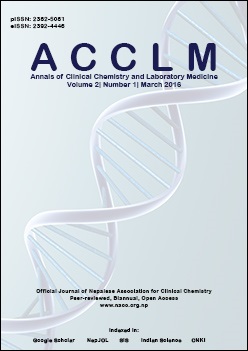Status of Serum Lipids in Individuals with Depression
DOI:
https://doi.org/10.3126/acclm.v2i1.14656Keywords:
Depression, Serum Lipid, DyslipidemiaAbstract
BACKGROUND
Epidemiological studies have shown the association between depressive illness with cardiovascular disease (CVD). Serum lipid abnormality is one of the major risk factor for cardiovascular disease. Therefore, this study aimed to access the status of Serum lipid in individuals with depression.
METHODS
A cross sectional study was carried out in Tribhuvan University Teaching Hospital (TUTH) over the period of 16 month from June 2011 to October 2012. A total of 85 individuals with depression and the same number of age-sex matched controls were enrolled in the study. Depression was diagnosed by Consultant Psychiatrist as per ICD-10-DCR criteria. Serum Lipid profile was assessed from both test and control groups after an overnight fasting. A written consent was taken for anthropometric data and sample collection.
RESULTS
Large numbers of depressive individuals were found to have Dyslipidemia. Total Cholesterol, TG was found to be significantly higher in test group compared to control. The mean HDL-cholesterol was found significantly lower in test group compared to control. No significant differences between test and control were observed in VLDL-cholesterol and LDL-cholesterol.
CONCLUSIONS
Serum lipid profile abnormalities are found high in individuals with depression. Based on the observation of this study, Serum Lipid abnormalities seen in individuals with Depression make them vulnerable to cardiovascular disease.
Downloads
Downloads
Published
How to Cite
Issue
Section
License
Authors who publish with this journal agree to the following terms:
- The author transfers copyright to the Nepalese Association for Clinical Chemistry.
- The journal publishes the work under a Creative Commons Attribution License that allows others to share the work with an acknowledgement of the work's authorship and initial publication in this journal and under the same share-alike license used here.
- Authors are able to enter into separate, additional contractual arrangements for the non-exclusive distribution of the journal's published version of the work (e.g., post it to an institutional repository or publish it in a book), with an acknowledgement of its initial publication in this journal.
- Authors are permitted and encouraged to post their work online (e.g., in institutional repositories or on their website) prior to and during the submission process, as it can lead to productive exchanges, as well as earlier and greater citation of published work (See The Effect of Open Access).




